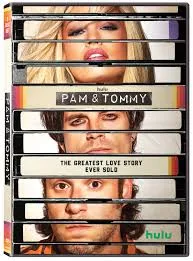Pam & Tommy (2022)
Disney + (8-episode miniseries)
The joyfulness of youth does not last forever. Its spills and its thrills fade with time. All the hormonally charged freshness of young adulthood eventually loses its mojo. They say we want to immortalise all these as you only live one (YOLO). Time and tide wait for no one too. Hence, there is a pressing need to freeze everything you have to last a lifetime. Time is man's greatest foe; the race between man and time always sided time.
This country, this world is no place for older men or women. It is all about youth, vibrancy and freedom. Even Nature sides the young. With wear and tear, the facial musculature of the old naturally sags, giving its wearer a perpetual frowning facies. In the words of Schaupenneur, the world is a miserable place, and Nature knows it. Senescence is grim. Hence, the lips curve downwards with age, opposite to how a smiling face of innocence appears.
 |
| Pamela Anderson, in her iconic role |
Photography and later video were God-sent. These can permanently capture the joy and visualisation of assets long after the battle scars of Hard Knocks of Life knock them down. With the advent of recording devices at everyone's disposal, immortalising that notable, intimate, non-event or pornographic material has never been easier.
It is a trend for newlyweds to digitally commemorate the image of their supple young bodies. As part of their wedding photography shootout, they even include a pose in their most sexually enticing pose in their birthday suits. This, they would like to admire way after the scars of life take over their mortal bodies.
Since everybody is doing it, the peer pressure to get a full monty representation of the shames of the Garden of Eden is ever compelling. So every average Jane does it, and nobody gives a second look. Not when the player is every young man's dream girl - the buxom Pamela Anderson who gained stardom appearing semi-naked every week on Baywatch and had appeared without a thread as Hugh Heffner's bunnies.
Pamela and her then-husband, the wild cocaine-snorting Motley Crew's drummer, Tommy Lee, found out the hard way when their intimate honeymoon sex tapes were stolen that the world is not kind.
Even though they laugh with you and encourage you to do whacky things, when you get on the wrong side of the law, you are actually alone. The world judges you through their conservative lens even though you think the world has changed. No siree. The media is there to yank you out of any shred of dignity still left you. Everybody just takes you to the cleaners. You are left shivering in the cold while everyone prospers on your account while you salvage whatever self-respect that is. Court injunctions and proceedings are just farce. It does not lead to anything meaningful.
The lesson here is that youth and love are many splendoured things. The underdevelopment of the neocortex of the frontal lobe makes you do many things. But remember, many of these things have long-term effects and ruin the rest of your remaining life. It is OK to be young and free, but freedom comes with specific responsibilities. You do not want to be stuck, on tenterhooks, for the rest of your remaining life with its aftermath.




























